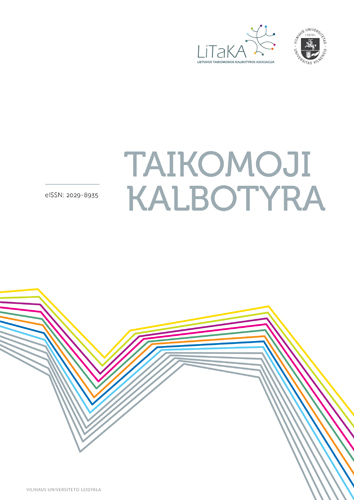Emocijų verbalizavimas keliakalbio diskurse. Atvejo analizė: Vytauto Civinskio Dienoraštis (1904-1910)
The verbalization of emotions in the discourse of a multilingual speaker. A case study: Diary (1904-1910) by Vytautas Civinskis
Author(s): Veronika GirininkaitėSubject(s): Psycholinguistics
Published by: Vilniaus Universiteto Leidykla
Keywords: psycholinguistics; multilingualism; code-switching; emotion verbalization; linguistic relativity;
Summary/Abstract: The article aims to discuss the verbalisation of emotions in the discourse of a multilingual person. First, an overview of linguistic investigation in the field of emotions is presented. Notably, linguistic expression of feelings in every given language sometimes lacks precision; moreover, the names of emotions in various languages do not correspond. This poses some problems for multilinguals who try to express their emotions in L2. Later, the paper focuses on a case study, mainly on a series of examples from the manuscript of Diary (1904–1910), an egodocument from the beginning of the 20th century written by a multilingual student Vytautas Civinskis. The Diary was written mainly in Polish, Russian and Lithuanian. Civinskis was inspired to classify his own emotions by his studies in psychology. The examples show that while writing about his emotions the diarist makes use of lexical units from various languages (Polish, Russian, German, French, Lithuanian), often not matching the language of the sentence. Presumably, he chooses not to translate the words incorporated in idioms or collocations and avoids translating the names of emotions, which are especially salient in some given language. The diarist is keen to quote the texts of literary and other origin; therefore, he sometimes names his emotion after the line of a wellknown poem or a song (such quotations are also kept in the original). The observed tendency to code-switch while talking about emotions corresponds to the results of some experiments carried out by the researchers of bilingualism. The case study also shows that research into emotion names in the discourse of multilinguals should rely on the results of research from the fields of lexical valency, semantics and psychology.
Journal: Taikomoji kalbotyra
- Issue Year: 2017
- Issue No: 9
- Page Range: 134-148
- Page Count: 15
- Language: Lithuanian

